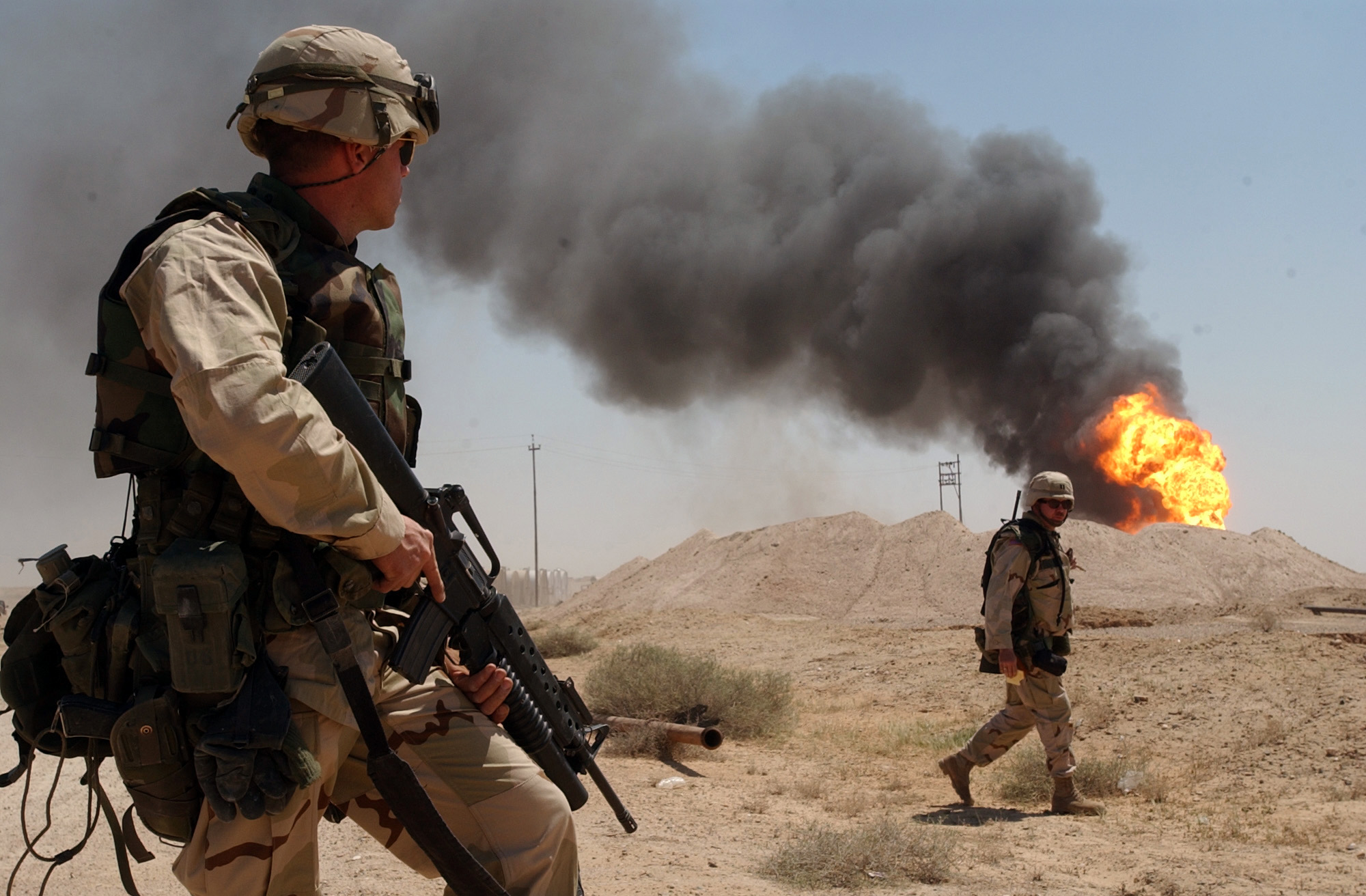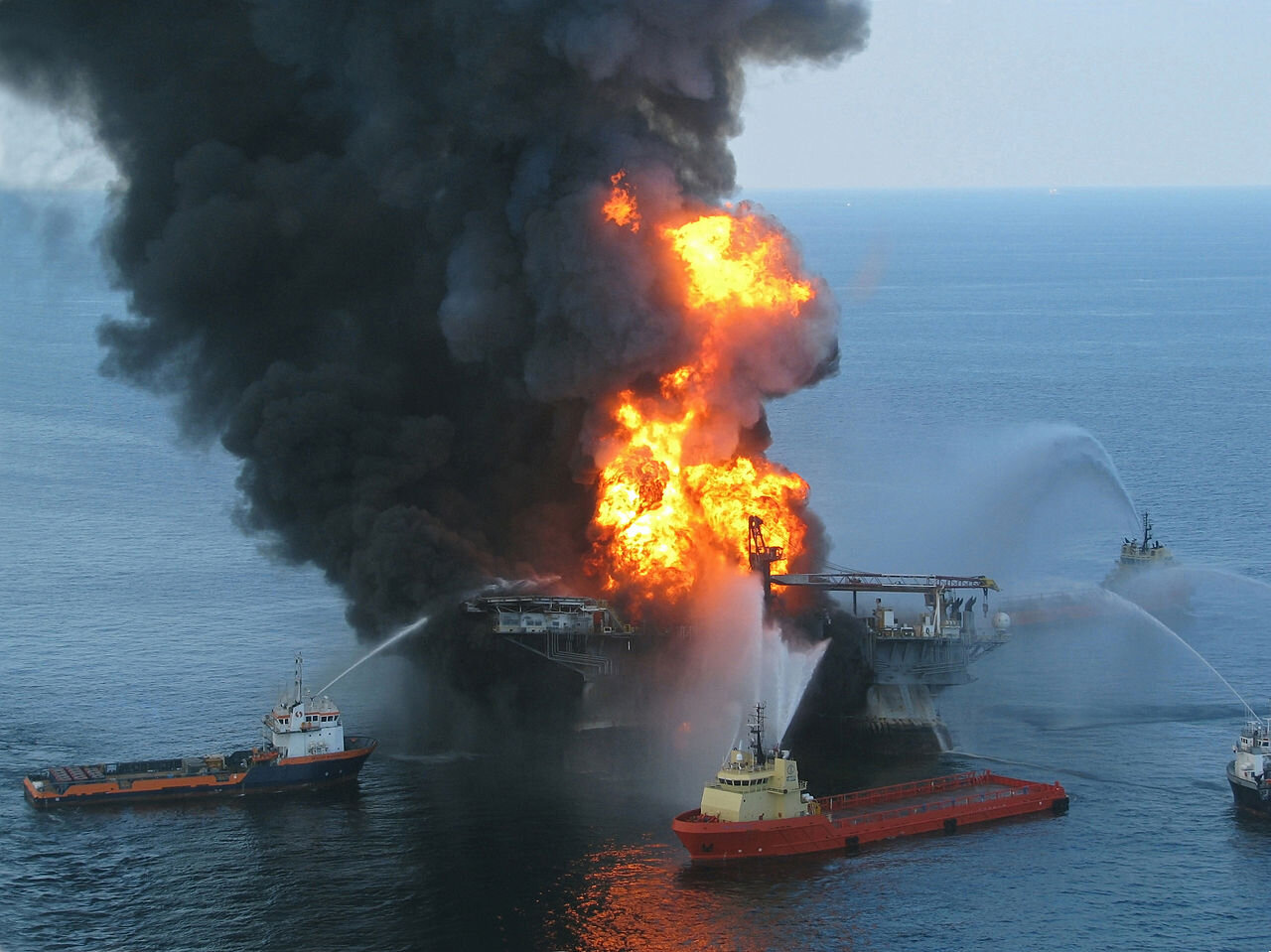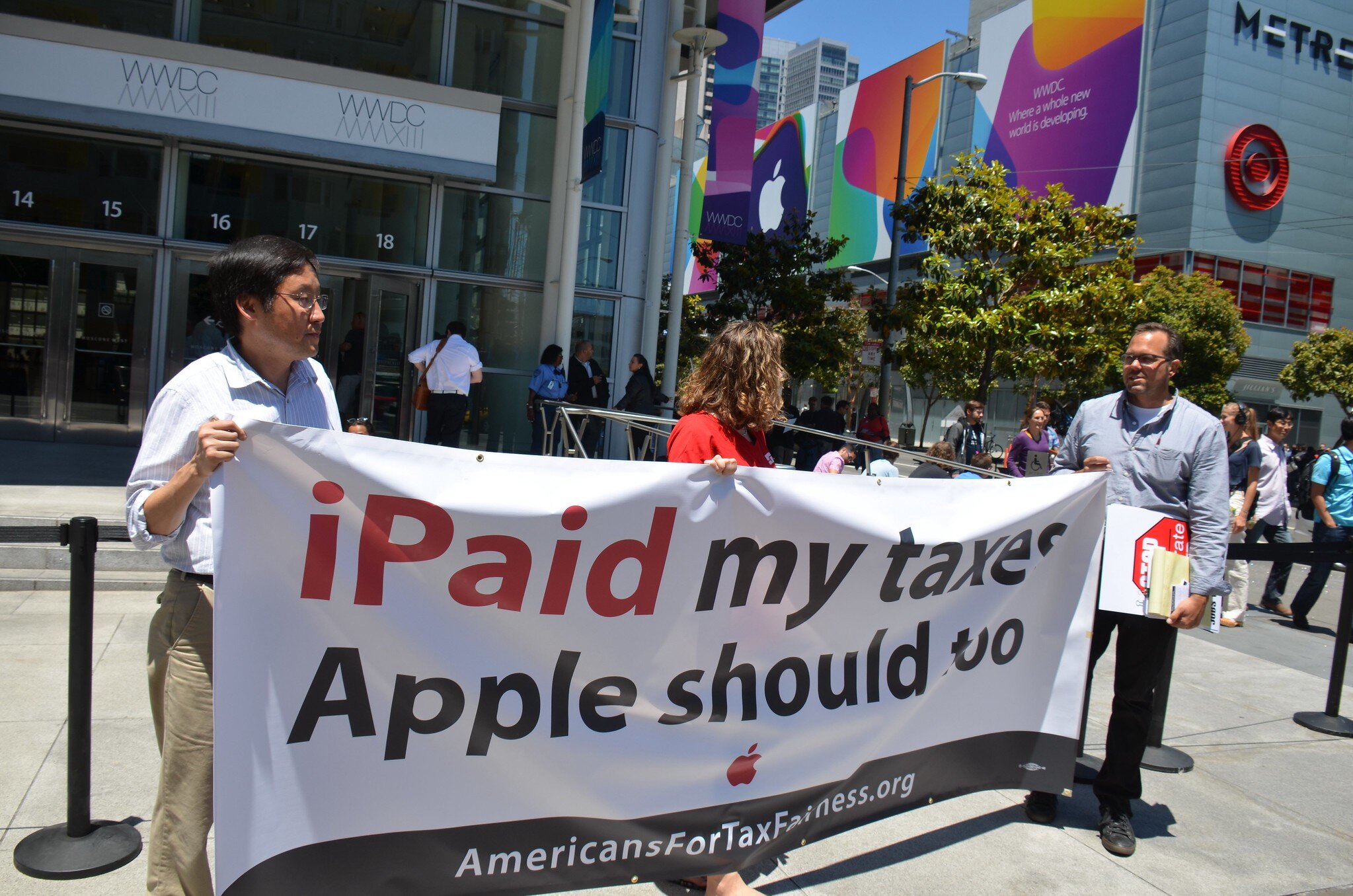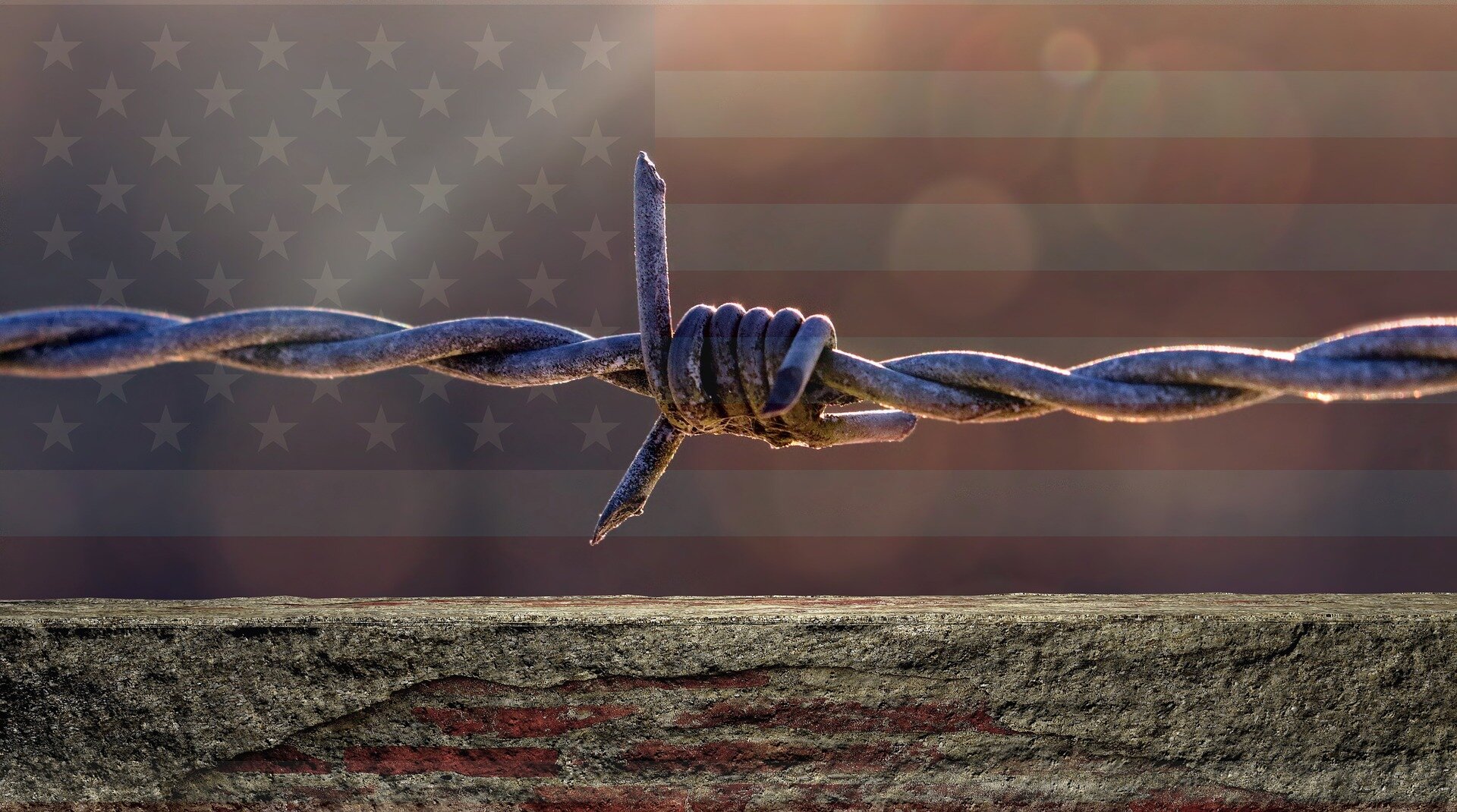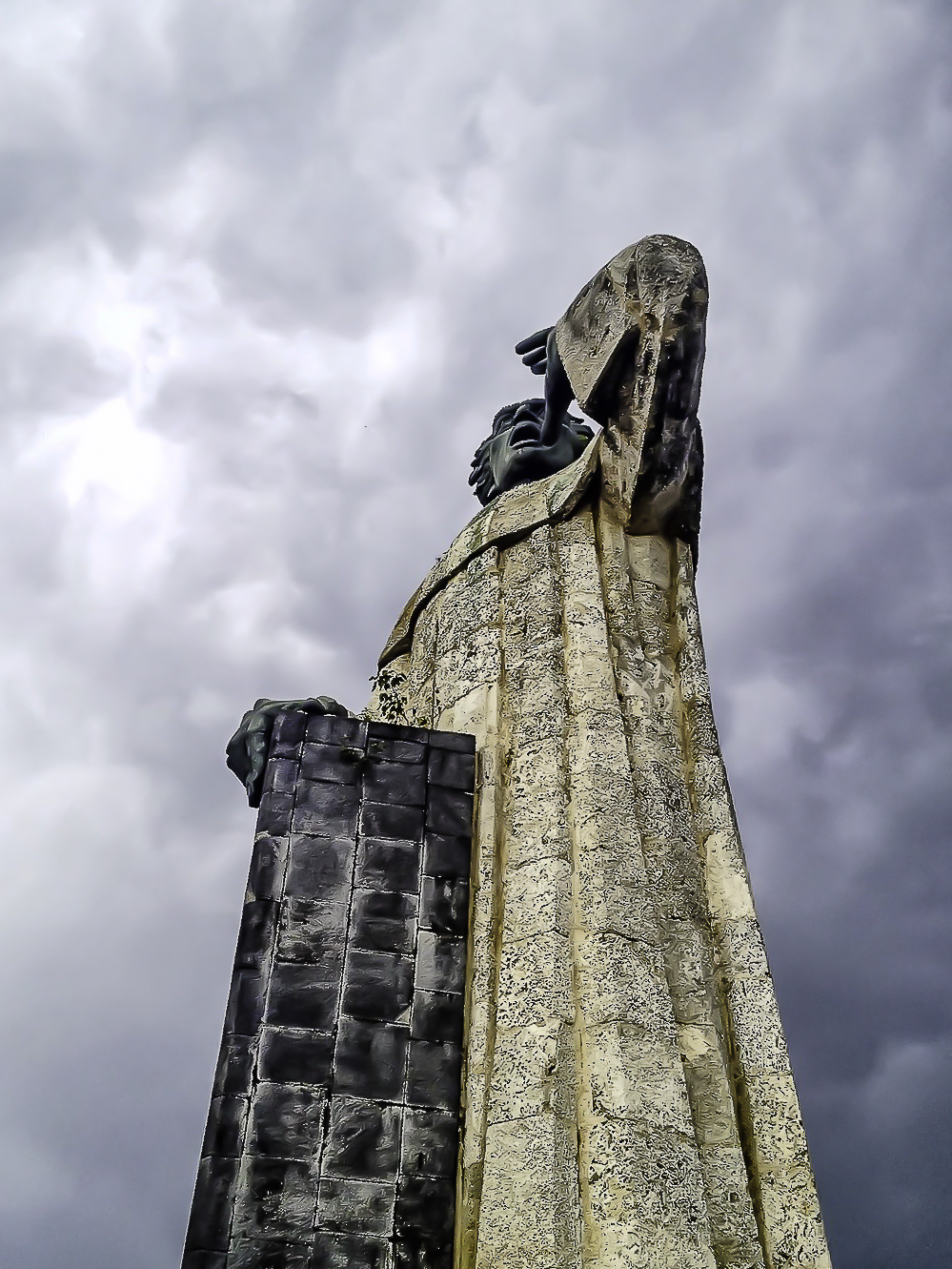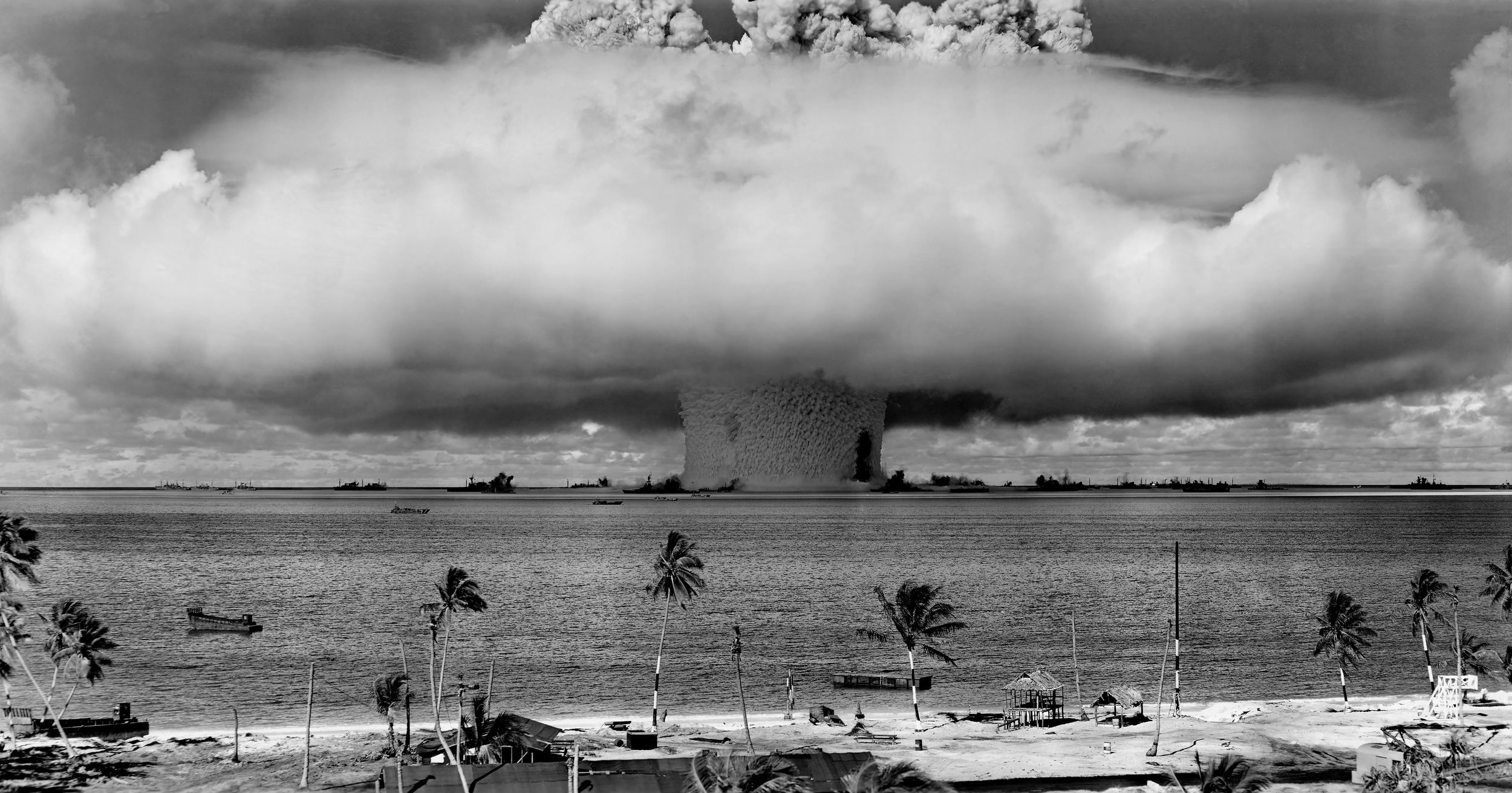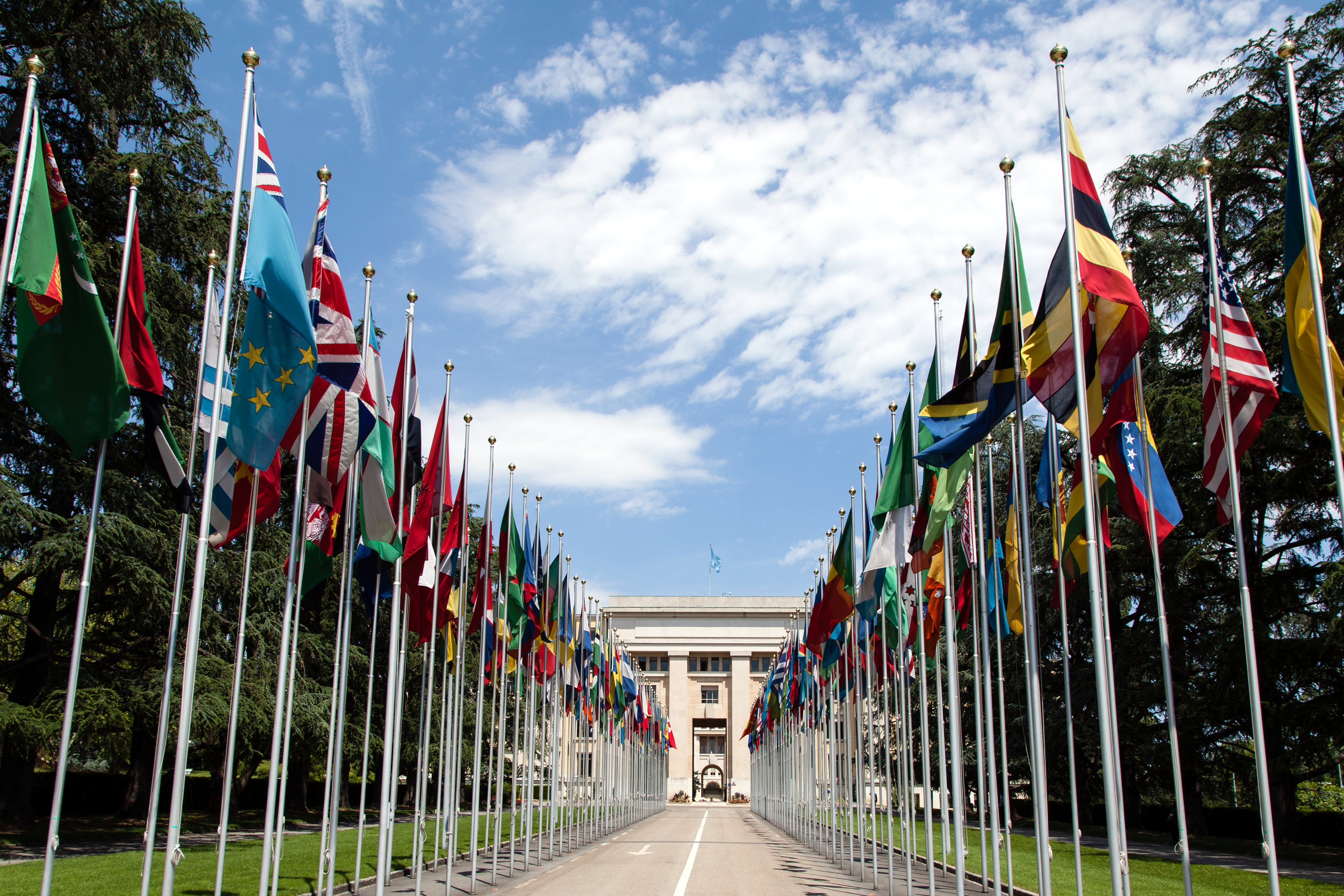U.S. Imperialism
Photograph: Southern, Iraq (Apr. 2, 2003) -- A U.S. Army Sergeant stands guard duty near a burning oil well in the Rumaylah Oil Fields in Southern Iraq. Oil wells were set ablaze in the early stages of Operation Iraqi Freedom. Operation Iraqi Freedom was the multi-national coalition effort to eliminate supposed weapons of mass destruction and end the regime of Saddam Hussein. Photo credit: U.S. Navy Photographer's Mate 1st Class Arlo K. Abrahamson | Public Domain, Wikimedia Commons.
Introduction
These resources explore moral and ethical challenges in international relations related to American imperialism. Since much of American Imperialism is not just military but corporate and economic, this page is cross-listed under the section on Corporate Law, which falls under the larger grouping, Christian Restorative Justice, Business, and Economics. This page is also cross-listed under the section on The Church and International Relations.
Other Resources on American Imperialism
The U.S. Dollar as the Global Currency
Ash Sarkar and Yanis Varoufakis, China vs. America, Big Tech, Capitalism and Techno-Feudalism (Part 3). How to Academy, Aug 24, 2024. Ash Sarkar to argue that capitalism is dead and present a game-changing new paradigm: technofeudalism. The owners of big tech have become the world's feudal overlords—replacing capitalism with a fundamentally new system that enslaves our minds, defies democracy, and rewrites the rules of global power. But as Varoufakis will also reveal, technofeudalism contains new opportunities to thwart and overturn it, bringing into focus more clearly than ever the revolution we need to escape our digital prison.” Varoufakis also argues that the reason the U.S. has not collapsed despite its debts and deficits is because it made the dollar the global currency. The U.S. therefore forces other countries to absorb its inflation and debts.
Zhang Weiwei and Yanis Varoufakis, How the U.S. Uses Wars to Fuel Perpetual Consumption. Thinkers Forum, Oct 15, 2024. Varoufakis notes that Marx said capitalism produces underconsumption. So the U.S. needs to manage global aggregate demand. He also points out that at the end of the Cold War in 1989, the U.S. had a stockpile of extra weapons and a military-industrial complex that was very engaged. They needed a war. Thus, they helped Saddam Hussein invade Kuwait. For context: In the 1980s, during the Iran-Iraq War, when Iraq accidentally hit an American naval vessel and killed U.S. officers, Dick Cheney flew to personally meet with Saddam Hussein and assure him it was ok. Kuwait financed that war. The U.S. ambassador in Iraq said the U.S. would not have a problem if Hussein took Kuwait. The U.S. then fought the first Gulf War against Saddam Hussein. He surrendered. The U.S. then fired cruise missiles and other weaponry into the desert to get rid of the supply. Hussein, having lost trust in the U.S., tried to redenominate Iraqi oil in Euros instead of dollars. That’s when the U.S. decided to take him out.
Lena Petrova, War on Global South: BRICS' mBridge to be Shut Down by Western Allies to Save the US Dollar. World Affairs in Context, Oct 29, 2024.
Rania Khalek, Trump, Europe’s Collapse & Why Liberals Keep Losing, w/ Yanis Varoufakis. BreakThrough News, Feb 22, 2025. Varoufakis argues that Trump will raise tariffs and then pressure other central banks to release their dollars. This will make their currencies decline. But Trump, he argues, will have to choose between Wall Street-real estate magnates vs. the average American to revive manufacturing, and will choose the former.
Ezra Klein, The Dark Heart of Trump's Foreign Policy. The Ezra Klein Show, Mar 1, 2025. Interview with journalist Fareed Zakaria. Trump views the post WWII alliance of “the West,” i.e. the U.S. and Europe and its allies, as disadvantageous to the U.S.
U.S. Military Activity Globally
Military Empires: A Visual Guide to Foreign Bases (website)
Cambridge Institute on Religion and International Studies (website)
Breaking the Silence (website) Israeli soldiers on the treatment of Palestinians by the State of Israel.
General James Rusling, Interview with President William McKinley. The Christian Advocate, Jan 22, 1903. 17. President McKinley believed God told him to take the Philippines from Spain, in order to “uplift and civilize and Christianize them.” This, despite the Philippines being the most Catholic country in Asia. See also Stephen Kinzer, American Imperialism — Overthrow, Part 1: Cuba, Iran, and the Philippines. Massachusetts School of Law at Andover, Jun 28, 2015. At the 41 minute mark, Kinzer criticizes McKinley for this decision and his sheer ignorance, as typical of white American religious-military views of the role of the U.S. to spread its “way of life” abroad.
Japanese Latin-Americans. Densho Encyclopedia. During World War II, the U.S. not only incarcerated Japanese-Americans, but Japanese Latin-Americans, like Isamu Shibayama (Wikipedia article). The logic apparently was an extension of the Monroe Doctrine.
“According to historians' estimates, the United States interned nearly 1,800 Japanese from Peru, 250 Japanese from Panama, and substantial numbers from Bolivia, Colombia, Costa Rica, Cuba, Ecuador, El Salvador, Mexico, Nicaragua, and Venezuela. Though it briefly considered exchanging Japanese Latin Americans for American civilians held captive abroad, the United States government primarily justified the deportation-internment program on the grounds of hemispheric security.”
Richard H. Curtiss, Truman Adviser Recalls May 14, 1948 U.S. Decision to Recognize Israel. Washington Report on Middle East Affairs, May 16, 1991. President Harry Truman, seeking reelection, followed the advice of Clark Clifford; he said, "I'm sorry, gentlemen, but I have to answer to hundreds of thousands who are anxious for the success of Zionism: I do not have hundreds of thousands of Arabs among my constituents." U.S. support for Israel is thus conditioned on the Zionist lobby domestically. It is significant that Truman was a Southern Baptist and Clifford a Methodist; Clifford in particular believed the Bible authorized Jewish right to the land.
Mireya Navarro, Guatemala Army Waged 'Genocide,' New Report Finds. New York Times, Feb 26, 1999. "A truth commission report made public today concluded that the United States gave money and training to a Guatemalan military that committed ''acts of genocide'' against the Mayans during the most brutal armed conflict in Central America, Guatemala's 36-year civil war."
Michael T. Klare, Resource Wars: The New Landscape of Global Conflict. Holt Paperbacks | Amazon page, Mar 2002.
Robert D. Kaplan, Warrior Politics: Why Leadership Demands a Pagan Ethos. Vintage | Amazon page, Jan 2003.
Noam Chomsky, Hegemony or Survival: America's Quest for Global Dominance. Holt Paperbacks | Amazon page, 2004.
Amy Chua, World on Fire: How Exporting Free Market Democracy Breeds Ethnic Hatred and Global Instability. Anchor | Amazon page, 2004.
Stephen Kinzer, Overthrow: America's Century of Regime Change from Hawaii to Iraq. Times Books | Amazon page, Apr 2006. “A fast-paced narrative history of the coups, revolutions, and invasions by which the United States has toppled fourteen foreign governments--not always to its own benefit. "Regime change" did not begin with the administration of George W. Bush, but has been an integral part of U.S. foreign policy for more than one hundred years. Starting with the overthrow of the Hawaiian monarchy in 1893 and continuing through the Spanish-American War and the Cold War and into our own time, the United States has not hesitated to overthrow governments that stood in the way of its political and economic goals. The invasion of Iraq in 2003 is the latest, though perhaps not the last, example of the dangers inherent in these operations. In Overthrow, Stephen Kinzer tells the stories of the audacious politicians, spies, military commanders, and business executives who took it upon themselves to depose monarchs, presidents, and prime ministers. He also shows that the U.S. government has often pursued these operations without understanding the countries involved; as a result, many of them have had disastrous long-term consequences. In a compelling and provocative history that takes readers to fourteen countries, including Cuba, Iran, South Vietnam, Chile, and Iraq, Kinzer surveys modern American history from a new and often surprising perspective.” See interview in American Imperialism—Stephen Kinzer, American Imperialism — Overthrow, Part 1: Cuba, Iran, and the Philippines and Stephen Kinzer, American Imperialism—Overthrow, Part 2: Iran, Vietnam, Chile. Massachusetts School of Law at Andover, Sep 5, 2015.
James Q. Wilson, American Exceptionalism. American Enterprise Institute, Aug 23, 2006.
Stephen Kinzer, All the Shah's Men: An American Coup and the Roots of Middle East Terror. Wiley | Amazon page, Jan 2008. The 1953 CIA coup in Iran that ousted the country’s elected prime minister, ushered in a quarter-century of brutal rule under the Shah, and stimulated the rise of Islamic fundamentalism and anti-Americanism in the Middle East.
Michael T. Klare, Rising Powers, Shrinking Planet: The New Geopolitcs of Energy. Amazon page, 2008.
Noam Chomsky, The U.S. Role in Haiti Destruction. Joe Friendly, Jun 9, 2010.
Michael T. Klare, The Race for What's Left: The Global Scramble for the World's Last Resources. Metropolitan Books | Amazon page, Mar 2012.
Howard Zinn, A Just Cause, Not a Just War. The Progressive, Dec 2001.
Michael Hudson, America's Monetary Imperialism. Global Dialogue, Winter/Spring 2003.
Noam Chomsky, When Elites Fail and What We Should Do About It. Pdxjustice Media Productions, Oct 22, 2009. From 45 min about the Vietnam War and U.S. policies of control in the Pacific.
Noam Chomsky and Glenn Greenwald, How the Law is Used to Destroy Equality and Protect the Powerful. CSpan, Oct 29, 2011. Especially at 29 min mark.
Jane Mayer, The Predator War: What Are the Risks of the C.I.A.’s Covert Drone Program? New Yorker Magazine, Oct 26, 2009.
Adam Hochschild, Haiti: The Aftershocks of History. New York Times, Dec 29, 2011.
Alan Dershowitz and Noam Chomsky, Debate About Israel, Harvard Institute of Politics, November 29, 2005. Posted by Scholar, 2016.
Noam Chomsky, The Economic Crisis, Warfare, and Social Change. DebatesandLectures, Feb 21, 2012.
Mark Mazzetti, America's Killing Machine. Economist, Apr 13, 2013. From his book The Way of the Knife: The CIA, a Secret Army, and a War at the Ends of the Earth
Jerome Roos, Financial Empire and the Global Debtors' Prison. Roar Magazine, May 6, 2013.
Ward Wilson, The Bomb Didn't Beat Japan... Stalin Did. Foreign Policy, May 30, 2013.
Franz Stasser, Border Security: US Rancher's Warning on Immigration Reform. BBC News, Jul 31, 2013.
Marcello Di Cintio, Walls: Travels Along the Barricades. Soft Skull | Amazon page, Aug 2013. See book review by Raja Shehadeh, A World of False Frontiers. Financial Times, Jul 26, 2013.
Michael Todd, China Lost 14 Million People in World War II. Why Is This Forgotten? Pacific Standard Magazine, Sep 17, 2013.
Stephen Kinzer, The Brothers: John Foster Dulles, Allen Dulles, and Their Secret World War. Times Books | Amazon page, Oct 2013. “During the 1950s, when the Cold War was at its peak, two immensely powerful brothers led the United States into a series of foreign adventures whose effects are still shaking the world. John Foster Dulles was secretary of state while his brother, Allen Dulles, was director of the Central Intelligence Agency. In this book, Stephen Kinzer places their extraordinary lives against the background of American culture and history. He uses the framework of biography to ask: Why does the United States behave as it does in the world? The Brothers explores hidden forces that shape the national psyche, from religious piety to Western movies―many of which are about a noble gunman who cleans up a lawless town by killing bad guys. This is how the Dulles brothers saw themselves, and how many Americans still see their country's role in the world. Propelled by a quintessentially American set of fears and delusions, the Dulles brothers launched violent campaigns against foreign leaders they saw as threats to the United States. These campaigns helped push countries from Guatemala to the Congo into long spirals of violence, led the United States into the Vietnam War, and laid the foundation for decades of hostility between the United States and countries from Cuba to Iran.” See one hour interview with C-SPAN, Stephen Kinzer, Author “The Brothers”. C-SPAN, Nov 7, 2013. Raised by missionary Presbyterian Calvinist parents from Syria and China, and other family members who were former government officials and diplomats in the American elite, they also became corporate lawyers — John Foster Dulles once worked for United Fruit — who saw the world and the US as being locked in a struggle between good and evil. Notice the anti-Catholic sentiment of John Foster Dulles, especially when his son became Catholic. See interview American Imperialism—Overthrow, Part 2: Iran, Vietnam, Chile. Massachusetts School of Law at Andover, Sep 5, 2015. Begins with more description of John Foster Dulles. His grandfather John Watson Foster served as Secretary of State and led the overthrow and annexation of Hawaii. Dulles’ worldview was quite Manichaean. Stephen Kinzer, The Brothers: John Foster Dulles, Allen Dulles and Their Secret World War. The University of Scranton, Nov 4, 2013. By far the most candid presentation Kinzer has given on the Dulles brothers. In this presentation, Kinzer makes the point that the Dulles brothers reflected general American sentiment, along three major factors. First, a Manichaean-style interpretation of Protestant missionary theology where the U.S. is good and other countries are evil, which is really the underlying moral cosmology of American exceptionalism and white saviorism. Second, a Western pioneer ethos, also present in their family, led to regime change in Hawaii via Secretary of State John Watson Foster. Third, their law firm, Sullivan and Cromwell, specialized in pressuring small countries to give into American corporations. Kinzer is a brilliant storyteller about how the CIA -- led by Allen Dulles -- overthrew democracy in Iran, Guatemala, and Vietnam.
Jeff Faux, NAFTA at 20: State of the North American Worker. Foreign Policy in Focus, Dec 13, 2013.
Timothy C. Morgan, Why We're Losing the War on Poverty. Christianity Today, Jan 8, 2014. Interview with Gary Haugen about the rule of law.
Noam Chomsky, The Prerogatives of Power. Truthout, Feb 5, 2014. On U.S. “spin” on foreign affairs and its own role.
Stephen M. Walt, Condemned to Repeat It: Why Washington's Foreign Policymakers Desperately Need to Study Up on Their History. Foreign Policy, Mar 10, 2014.
Philip Giraldi, Recovering the Founders' Foreign Policy. The American Conservative, May 6, 2014.
Henry Giroux, Noam Chomsky and the Public Intellectual in Turbulent Times. Truthout May 12, 2014.
Paul Jay, Global Capitalism, the US Empire, and Russian Nationalism. Truthout, May 12, 2014.
Jon Letman, The Militarized Pacific: An Anniversary Without End. Truthout, May 14, 2014.
Beth Parry, To Understand What Life Is Really Like in Israel and Palestine, Follow This Chart. PolicyMic, May 15, 2014.
Noam Chomsky, America's Real Foreign Policy. TomDispatch, Jul 1, 2014.
Anand Gopal, The US Government Never Understood Afghanistan and Still Doesn't. Truth Out, Sep 18, 2014.
Noam Chomsky, The Crimes of U.S. Presidents. Chomsky Philosophy, Oct 7, 2014. From Eisenhower to G.W.Bush.
Michael T. Clare, Obama's New Oil Wars. Huffington Post, Oct 9, 2014.
William Rivers Pitt, George W. Bush: The Gift That Keeps on Giving. Truth Out, Oct 18, 2014.
Jordan Michael Smith, Vote All You Want. The Secret Government Won't Change. Boston Globe, Oct 19, 2014.
Erica Chenowith, Nonviolent Conflicts in 2014 You May Have Missed Because They Were Not Violent. Political Violence at a Glance blog, Dec 31, 2014.
Jon Basil Utley, Libertarians and Putin's Catastrophic Corruption. The American Conservative, Jan 2, 2015.
Nick Turse, The Golden Age of Black Ops. Huffington Post, Jan 20, 2015.
Frank Bruni, Christians Loving Jews: Benjamin Netanyahu, John Boehner, and America's Evangelicals. New York Times, May 7, 2015.
Nicholas Kristof, Smart Girls vs. Bombs. New York Times, Apr 11, 2015.
Stephen Kinzer, The World of Threats to the U.S. is an Illusion. Boston Globe, Apr 12, 2015.
Jennifer Siegel, For Peace and Money: French and British Finance in the Service of Tsars and Commissars. Oxford University Press | Amazon page, 2014. See book review by William Anthony Hay, The Debtor's Road to Peace and Prosperity. The American Conservative, May 19, 2015.
Sam Harris & Noam Chomsky Email Exchange. Young Turks video, May 14, 2015. See 8:43 mark for Sam Harris' cultural imperialism
Seumas Milne, Now the Truth Emerges: How the US Fueled the Rise of Isis in Syria and Iraq. The Guardian UK, Jun 3, 2015.
Anita Isaacs, America's Second Chance in Guatemala. New York Times, Jun 22, 2015.
Peter Beinhart, Why the Iran Deal Makes Obama's Critics So Angry. The Atlantic, Jul 14, 2015.
Scott McConnell, Why Is Washington Addicted to War? The American Conservative, Jul 15, 2015.
Elizabeth Parker, How the Hell Does ISIS Get All Those Tanks, Weapons, and Shiny New Toyota Trucks? Reverbpress, Oct 8, 2015.
Economist, Yearning to Be Free. Economist, Oct 17, 2015. about the history of refugee resettlement in the U.S.
David Vine, 'My Body Was Not Mine, But the U.S. Military's'. Politico, Nov 1, 2015. Inside the disturbing sex industry thriving around America's bases
David Stockman, How Islamic Extremism Was Born - When the Warfare States of the West Revived Jihad to Fight Godless Communism. David Stockman's Contra Corner, Nov 18, 2015.
Kamel Daoud, Saudi Arabia, and ISIS That Has Made It. New York Times, Nov 20, 2015.
German Lopez, Obama is Right: ISIS Really Does Want U.S. Boots on the Ground. Here's How We Know. Vox, Dec 6, 2015.
Natalie Miller, Will Washington Greenlight Another Coup in Haiti? Foreign Policy in Focus, Dec 8, 2015.
Andrew O'Hehir, Oil, Money, Politics, and Evil: Our Leading Middle East Ally is the Worst Country Imaginable. Salon, Jan 9, 2016. re: Saudi Arabia
Mike Lofgren, Hubris Takes Them All Down: This is Why Every President Makes the Same Dumb Mistakes. Salon, Jan 10, 2016. citing also the anti-intellectual Christian reactions
Steve Benen, On Iran, Reagan Is the Wrong Example to Follow. MSNBC, Jan 18, 2016.
Lara Friedman, Israel's Unsung Protector: Obama. New York Times, Apr 10, 2016.
Jeffrey Goldberg, The Obama Doctrine. The Atlantic, Apr 2016.
New York Times Editorial Board, The World Reaps What the Saudis Sow. New York Times, May 27, 2016.
Josh Marshall, Trump & Putin. Yes, It's Really a Thing. Talking Points Memo, Jul 25, 2016. On Trump's indebtedness to Russian financiers close to Putin
Josh Gerstein, Obama Releases Drone Strike 'Playbook'. Politico, Aug 6, 2016.
Emma Green, Why Does the US Give So Much Money to Israel? The Atlantic, Sep 15, 2016.
Daniel Larison, Rules for Military Intervention. The American Conservative, Sep 20, 2016.
Matt Purple, Rand Paul is Right: The US Must Stop Arming Saudi Arabia. Rare, Sep 22, 2016.
Charles Krauthammer, The Stillborn Legacy of Barack Obama. National Review, Oct 6, 2016. A hawkish critique on Syria and Russia
Ninaj Raoul, Bill Clinton's Trade Policies Destroyed Haitian Rice Farming, Now Haiti Faces Post-Hurricane Famine. Democracy Now, Oct 11, 2016.
Bob Woodward, Trump Is About To Learn All Of 'Our Deep Secrets'. World, Washington Post, Nov 13, 2016.
Nina Agrawal, The U.S. Is No Stranger to Interfering in the Elections of Other Countries, Los Angeles Times, Dec 21, 2016.
Zaid Jilani, Obama Allows Toothless UN Resolution Against Israeli Settlements to Pass. The Intercept, Dec 23, 2016.
Stephen Kinzer, The True Flag: Theodore Roosevelt, Mark Twain, and the Birth of American Empire. Henry Holt and Co. | Amazon page, Jan 2017. At the dawn of the twentieth century, when the United States first found itself with the chance to dominate faraway lands. That prospect thrilled some Americans. It horrified others. Their debate gripped the nation. The country’s best-known political and intellectual leaders took sides. Theodore Roosevelt, Henry Cabot Lodge, and William Randolph Hearst pushed for imperial expansion; Mark Twain, Booker T. Washington, and Andrew Carnegie preached restraint. Only once before―in the period when the United States was founded―have so many brilliant Americans so eloquently debated a question so fraught with meaning for all humanity. All Americans, regardless of political perspective, can take inspiration from the titans who faced off in this epic confrontation. Their words are amazingly current. Every argument over America’s role in the world grows from this one. It all starts here.”
Glenn Greenwald, Obama Killed a 16-Year-Old American in Yemen. Trump Just Killed His 8-Year-Old Sister. The Intercept, Jan 30, 2017.
Pankaj Ghemawat and Steven A. Altman, Is America Enriching the World at Its Own Expense? That’s Globaloney. The World is Far Less Globalized Than People Tend to Think. Washington Post, Feb 3, 2017.
Belen Fernandez, Power for Capital's Sake. Jacobin Magazine, May 26, 2017. 1984 Kissinger Commission shows that American intervention is a bipartisan project
Jon Schwarz, We Need Memorial Day to Obscure the Unbearable Truth About War. The Intercept, May 29, 2017. War is not simply between societies, but a war within societies.
Jeremy Scahill, Donald Trump and the Coming Fall of the American Empire. The Intercept, Jul 22, 2017. CIA activities abroad
Vincent Bevins, What the United States Did in Indonesia. The Atlantic, Oct 20, 2017. A trove of recently released documents confirms that Washington’s role in the country’s 1965 massacre was part of a bigger Cold War strategy.
Daniel Lazare, How U.S.-Saudi Marriage Gave Birth to Jihad. The American Conservative, Nov 2, 2017.
Gregory Shupak, Media Erase US Role in Syria’s Misery, Call for US to Inflict More Misery. FAIR, Mar 7, 2018.
Amy Goodman and Juan Gonzalez, Overthrow: 100 Years of U.S. Meddling & Regime Change, from Iran to Nicaragua to Hawaii to Cuba. Democracy Now, Mar 12, 2018. An interview with Stephen Kinzer.
Amy Goodman, MLK’s Fight Against Racism, Militarism, and Capitalism: Historian Taylor Branch on King’s Final Years. Democracy Now, Apr 4, 2018. In a speech on April 4, 1967, King condemned the Vietnam War and the U.S. government as “the greatest purveyor of violence in the world.” To hear the speech, see Amy Goodman, Special: Dr. Martin Luther King, Jr. In His Own Words. Democracy Now, Jan 20, 2020. In 1968, King spoke out for poor sanitation workers who took shelter in their garbage truck during a rainstorm, and were crushed by the compactor.
David Frum, Trump's Reckoning Arrives. The Atlantic, May 24, 2018.
Todd Tucker, How Mexico Could Force America's Hand on Immigrants. Politico, Jun 22, 2018. Through the Organization of American States, OAS, remarkably and ironically.
Stephen M. Walt, It Still Doesn't Get Worse Than Afghanistan. Foreign Policy, Jul 9, 2018.
Krishnadev Calamur, The UN Human Rights Council Is a Deeply Flawed Body. The Atlantic, Jun 20, 2018. subtitled, "The U.S., which withdrew from the organization Tuesday, had sought to reform it" - true enough given that Saudi Arabia is on the council to investigate Israel-Palestine; but the US itself? See Lauren Wolfe, Trump’s Insidious Reason for Leaving the UN Human Rights Council. The Atlantic, Jun 20, 2018.
Daniel Larison, The Trump Administration's Cruel Collective Punishment of the Iranian People. The American Conservative, Aug 30, 2018.
Vox, How the Saudis Ended Up With So Many American Weapons. Vox, Dec 14, 2018. A 10 minute video
Eric Levitz, How American Exceptionalism Is a Dangerous Myth. New Yorker Magazine, Jan 2, 2019. Involving American foreign policy
Alex Emmons, See No Evil: Pentagon Issues Blanket Denial That It Knows Anything About Detainee Abuse in Yemen. The Intercept, Jan 7, 2019.
Daniel Immerwahr, How to Hide an Empire: A History of the Greater United States. Farrar, Straus and Giroux | Amazon page, Feb 19, 2019. Traces the activities and impact of the U.S. on Guam, the Philippines, Puerto Rico, and other colonies. See reviews by Jennifer Szalai, ‘How to Hide an Empire’ Shines Light on America’s Expansionist Side. New York Times, Feb 13, 2019. See also Bridey Heing, How to Hide an Empire. Longreads, Mar 2019. See also Amy Goodman and Juan Gonzalez, “How to Hide an Empire”: Daniel Immerwahr on the History of the Greater United States. Democracy Now, Mar 5, 2019. A 30 minute video interview on a very important subject: colonialization, imperialism, and the legal gray zone of the territories. Starts with the Northwest Ordinance on the continent; white supremacy needed for a territory to become a state. e.g. the Native American governing majority called “Sequoia” which was once proposed, rejected, and absorbed in the white majority state Oklahoma. ; the Pacific interests of the US and Hawaiian statehood; the cover-up of the Japanese attack on the Philippines; medical experimentation done on people in territories; etc.
Emma Vigeland, Alexandria Ocasio-Cortes Was Right About Puerto Rico. Rebel HQ, Mar 12, 2019.
Narges Bajoghli, The Hidden Sources of Iranian Strength. Foreign Policy, May 15, 2019. “Iran’s ties with its proxies are far deeper than the Trump administration understands.” Ties are voluntary, not mercenary, and fueled by religious vision.
Rachel Maddow, Betrayal: The Plot That Won the White House. The Rachel Maddow Show | MSNBC, Oct 6, 2019. How candidate Richard Nixon - in 1968, in his first successful campaign, not the 1972 campaign which involved the infamous Watergate scandal - undermined peace talks between North and South Vietnam in order to make Democratic efforts to bring peace flounder; see also John A. Farrell, When a Candidate Conspired With a Foreign Power to Win An Election. Politico, Aug 6, 2017. “It took decades to unravel Nixon’s sabotage of Vietnam peace talks. Now, the full story can be told.” This incident highlights the role of imperial power and foreign relations in politics, as well as the role of intelligence agencies.
BBC News, US Says Israeli Settlements Are No Longer Illegal. BBC News, Nov 18, 2019.
John Roosa, The Fantasy World of US Empire. Jacobin Magazine, Dec 2, 2019. Response to the view that the Vietnam War was a civil war in Vietnam, and winnable by the US.
Craig Whitlock, Jr., At War With the Truth: The Afghanistan Papers: A Secret History of the War. Washington Post, Dec 9, 2019. See also The Young Turks, Report: US Officials Lied About Afghanistan. The Young Turks, Dec 15, 2019. Donald Rumsfeld refused to pursue Osama Bin Laden in 2005 when Bin Laden was cornered, to prolong the war; money wasted by military contractors in fraud and corruption
Anatoly Kurmanaev and Clifford Krauss, To Survive, Venezuela’s Leader Gives Up Decades of Control Over Oil. New York Times, Feb 8, 2020. “Faced with a severe economic crisis, the country’s leader, Nicolás Maduro, is letting foreign firms take over daily operations of its oil fields. It’s a break with core tenets of his socialist revolution.”
Johnny Harris, How the U.S. Snagged All These Islands. Johnny Harris, Aug 26, 2020. Initially, the U.S. gave “rights” to U.S. citizens to take over islands because farmers needed guano fertilizer.
Hal Brands, Peter Feaver, and William Inboden, In Defense of the Blob: America’s Foreign Policy Establishment Is the Solution, Not the Problem. Foreign Affairs, Apr 29, 2020. A perspective relating real geopolitics against pure neoliberalism.
Johnny Harris, How the U.S. Stole an Island. Johnny Harris, Jun 9, 2020. The Chagos Archipelago in the Indian Ocean: The U.K. “owns” this island, having displaced the people, and allow the U.S. military to occupy it.
Sarah Lazare, “Colonizing the Atmosphere”: How Rich, Western Nations Drive the Climate Crisis. In These Times, Sep 14, 2020. “New analysis finds the Global North is responsible for 92% of all excess global carbon dioxide emissions, while the Global South bears the brunt of the devastation.” See also Christine MacDonald, Exxon Spends Millions on Facebook To Keep the Fossil Fuel Industry Alive. In These Times, Oct 20, 2020. “Aided by a right-wing political consulting firm, the company is rallying supporters to fight for oil and gas interests at every level of government.”
Johnny Harris, How The U.S. Stole the Middle East. Johnny Harris, Sep 16, 2020. Standard Oil in Saudi Arabia.
Kevin T. Dugan, Inside Operation Gideon, a Coup Gone Very Wrong. Rolling Stone, Dec 7, 2020. “Why did three American ex-Special Forces soldiers try to overthrow the Venezuelan government?” “After Blackwater mercs gunned down 14 civilians at Nisour Square in Baghdad in 2007, the U.S. cut the flow of money to military contractors. But according to Doug Brooks, the former head of a private-security industry group, the business didn’t go away. It just got smaller, harder to track, and more clandestine. “Most Americans, when they think of private security, they think of Blackwater, and that’s the Jurassic age at this point,” McFate says. “The whole industry has gone full-on mercenary. And there are a lot of charlatans in the business.””
ENDEVR, Who Rules America: The Rise of The Military-Industrial Complex. ENDEVR Documentary, Dec 27, 2020. Interviews William Hartung, Prophets of War: Lockheed Martin and the Making of the Military-Industrial Complex. Bold Type Books | Amazon page, Mar 2012. Also, interviews Chris Hedges who argues that companies and executives are predatory on the nation and political process, and Michael Klare who argues fossil fuel industries are also running the country. Electronics and robotics are also tied in. Banking supports the military-industrial complex, too.
Matthew Cole, Project Opus. The Intercept, Feb 26, 2021. “Erik Prince and the Failed Plot to Arm a CIA-Asset-Turned-Warlord in Libya”
Non-Voting Felon, Twitter. Mar 3, 2021. About American Samoa and economic and political conditions there
Saagar Enjeti, Pentagon Plot To Manufacture Consent For Never Leaving Afghanistan. Rising | The Hill, Mar 10, 2021.
Aviva Chomsky, Joe Biden’s Central America Plan Is a Cruel Joke. Jacobin Magazine, Apr 27, 2021.
Jeremy Scahill, Empire Politician: A Half-Century of Joe Biden’s Stances on War, Militarism, and the CIA. The Intercept, May 2021. See also interview by Krystal Ball and Saagar Enjeti, Jeremy Schaill: Will Joe Biden Undo the Foreign Policy Record He Created? (RIsing | The Hill, May 3, 2021.
Richard Wolff, Economic Update: How US Capitalism Uses Nationalism. Democracy At Work, May 3, 2021. gives a helpful history since the late 1800s.
Ryan Grim and Emily Jashinsky, Ryan and Emily Debate: Did Soviets End The Holocaust? Rising | The Hill, Jun 10, 2021. The debate was prompted by Ilhan Omar’s comment about the US and the State of Israel being sponsors of terrorism and “unthinkable atrocities.” Ryan Grim astutely points out that the Right wants to say “all lives matter” except in foreign policy.
Sam Seder and Emma Vigeland, Ryan Grim Destroys New ‘Rising’ Cohost. The Majority Report, Jun 11, 2021. discuss Rep. Ilham Omar’s claim that the U.S. has committed atrocities, too. Ryan Grim tells the history of U.S. involvement with Nazis against the U.S.S.R. and socialist governments in Latin America.
Second Thought, "The US Doesn't Meddle In Foreign Affairs". Second Thought, Jul 23, 2021. highlights especially US interference in Latin America, to overthrow democratic socialism and install pro-capitalist regimes.
Anand Giridharadas, A Deeper Look At Who The Taliban Is 20 Years Later. MSNBC, Aug 16, 2021. An interview with Anand Gopal, No Good Men Among the Living: America, the Taliban, and the War through Afghan Eyes. Metropolitan Books | Amazon page, 2014. See also Krystal Ball and Saagar Enjeti, Afghanistan Collapse: Everything You Need To Know About Fall Of Kabul. Breaking Points, Aug 16, 2021. An important 25 minute video defending Biden’s decision to leave Afghanistan, generally, and how the U.S. Pentagon and Intelligence Community deceived leaders and the public about how “winnable” the U.S. nation-building war in Afghanistan was. Ryan Grim, How The Soviets Outdid The U.S. In Afghanistan. Rising | The Hill, Aug 17, 2021. Gives more historical context on the Soviet disinclination and then invasion of Afghanistan in the 1970s; the US wanted to maintain the fiction that the Afghan Forces could resist the Taliban, therefore the US did not coordinate refugee resettlement or prevent military equipment from falling into Taliban hands. See Krystal Ball and Saagar Enjeti, Exposing Grifters Of Afghan War: Defense Contractors, Presidents, Media. Breaking Points, Aug 19, 2021. Cody Johnston, Who To "Blame" For Afghanistan. Some More News, Aug 31, 2021. Gives a data-filled storyline on American failures throughout the 20 year period. Ryan Grim, The CIA Needs To Be Prosecuted Now That The War In Afghanistan Is Over. Rising | The Hill, Aug 31, 2021. spotlights CIA misconduct. Ryan Grim, Cable News Hiding Defense Industry Ties Of Its Military Analysts. Rising | The Hill, Aug 19, 2021. former military leaders become corporate investors and leaders and consultants, and then media spokespeople advocating for more war. Farah Stockman, The War on Terror Was Corrupt From the Start. New York Times, Sep 13, 2021. notes, “Afghan corruption is so frequently cited [by Western agents] as an explanation. as well as an excuse. for Western failure in Afghanistan… whilst ignoring their role in both fueling and benefiting from the patronage pump. Who won the war on terror? American defense contractors.” Johnny Harris, Here’s Who Really Won the War in Afghanistan. Johnny Harris, Mar 23, 2022. profiles the top 5 people who profited from the war.
Johnny Harris, How The US Stole The Philippines. Johnny Harris, Aug 18, 2021. In this case, the U.S. Supreme Court decided that the Constitution does not follow the flag. Instead, the Court allowed Congress to declare them “unincorporated territories.”
Niall Ferguson, Why the End of the American Empire Won’t Be Peaceful. The Hong Kong Posts | Wall Street Journal, Sep 5, 2021.
Farah Stockman, The War on Terror Was Corrupt From the Start. The New York Times, Sep 13, 2021.
Kim Iversen, Iron Dome Funding Boosts U.S. Defense Industry Profits, AOC Tearfully Votes ‘Present’. Rising | The Hill, Sep 29, 2021. excellent spotlight on defense spending as a kickback to the U.S. defense industry
Amy Goodman, Juan Gonzalez, Ramon Mejia, War Helps Fuel the Climate Crisis as U.S. Military Carbon Emissions Exceed 140+ Nations. Democracy Now, Nov 9, 2021. See also Amy Goodman and Amitav Ghosh, “A Process of Violence”: Indian Author Amitav Ghosh on How Colonialism Fueled the Climate Crisis. Democracy Now, Nov 10, 2021.
Second Thought, The Opioid Crisis Is Much Worse Than You Think. Second Thought, Nov 26, 2021. Makes an incredible, integrated argument that historically, part of U.S. imperialism abroad involved the promotion and sale of drugs. The Sackler family at Perdue Pharma simply deployed the same predatory strategy but against white Americans domestically. Important resources listed in bibliography.
Richard Wolff, Capitalism Depends on Empire. Democracy at Work, Dec 1, 2021. Wolff gives very helpful political and economic perspective
Krystal Ball and Saagar Enjeti, Oliver Stone: All Evidence Points To JFK Murder Conspiracy. Breaking Points, Dec 6, 2021. JFK sought to defund the military and focus on peace-diplomacy efforts, which threatened the Pentagon budget and power. Intriguing stories.
Michael Hudson, America Defeats Germany for the Third Time in a Century: The MIC, OGAM and FIRE Sectors Conquer NATO. The Saker, Feb 28, 2022.
Catherine Porter, Constant Méheut, Matt Apuzzo and Selam Gebrekidan, The Root of Haiti’s Misery: Reparations to Enslavers. New York Times, May 20, 2022. See also Amy Goodman and Juan Gonzalez, Debt, Coups & Colonialism in Haiti: France & U.S. Urged to Pay Reparations for Destroying Nation. Democracy Now, May 24, 2022. “We look in depth at “The Ransom,” a new series in The New York Times that details how France devastated Haiti’s economy by forcing Haiti to pay massive reparations for the loss of slave labor after enslaved Haitians rebelled, founding the world’s first Black republic in 1804.” Interviews historians Westenley Alcenat and Gerald Horne on how Haitian demands for reparations have been repeatedly shut down, how Haiti was repeatedly isolated by the US, and how the NY Times itself platformed racist propaganda about Haiti.
David Doel, Republican John Bolton Admits To Planning Coups In CNN Interview. The Rational National, Jul 12, 2022. Bolton admitted to planning coups, referring vaguely to Venezuela. Doel highlights Bolivia, and major news outlets protecting the US government and military.
Amy Goodman, Jeffrey Sachs: U.S. Policy & "West's False Narrative" Stoking Tensions with Russia, China. Democracy Now, Aug 30, 2022. An excellent summary of the neoconservative vision of the US as the unipolar superpower.
Jason Burke, Revealed: How UK Targeted American Civil Rights Leader in Covert Campaign. The Guardian UK, Sep 13, 2022. “Secret Foreign Office unit distributed literature from fake sources to discredit Stokely Carmichael.”
Saagar Enjeti, Trump: 'I Will Purge War Mongering Deep State. Breaking Points, Feb 23, 2023. Saagar examines Trump’s actual record as President and finds it doesn’t hold up, so his promises for the future are unlikely to be sincere.
Mehdi Hasan, 20 Years On, Should George W. Bush Be on Trial for Iraq? The Mehdi Hasan Show | MSNBC, Mar 16, 2023. U.S. Casualties: 4,418 dead and 31,994 wounded. Iraqi Casualties: 275,000 - 306,000 dead from direct violence; several times that from indirect effects of war. In Fallujah after U.S. bombing, Iraqi childhood cancers increased twelvefold from 2004 - 2010 and 14.7% of children were born with birth defects 2009 - 2011. From an international law standpoint, the U.S. invasion of Iraq was illegal and was named as such by the United Nations. The Bush administration waged a war on truth. See also Mehdi Hasan, Mehdi Debates Ex-Iraq Hawk on Whether Bush Should Be Arrested. The Mehdi Hasan Show | MSNBC, Mar 30, 2023. Tom Nichols points out the international support at the time, but Mehdi Hasan still poses UN opposition.
Peter Baker, A Four-Decade Secret: One Man’s Story of Sabotaging Carter’s Re-election. New York Times, Mar 18, 2023. “A prominent Texas politician said he unwittingly took part in a 1980 tour of the Middle East with a clandestine agenda.” “What Mr. Barnes said he did not realize until later was the real purpose of the mission: to sabotage the re-election campaign of the president of the United States. It was 1980 and Jimmy Carter was in the White House, bedeviled by a hostage crisis in Iran that had paralyzed his presidency and hampered his effort to win a second term. Mr. Carter’s best chance for victory was to free the 52 Americans held captive before Election Day. That was something that Mr. Barnes said his mentor was determined to prevent.”
Choe Sang-Hun, A Brutal Sex Trade Built for American Soldiers. New York Times, May 2, 2023. “It’s a long-buried part of South Korean history: women compelled by force, trickery or desperation into prostitution, with the complicity of their own leaders.”
Claire Provost and Matt Kennard, Silent Coup: How Corporations Overthrew Democracy. Bloomberg Academic | Amazon page, May 4, 2023. See interview by PoliticsJOE, Investigative Journalist Charts How Corporate Greed Has Destroyed Democracy | Matt Kennard Interview. PoliticsJOE, Jun 10, 2023. A one hour interview, excellent overview of the book, mostly focusing on how US and UK corporations controlled foreign policy, the IMF, the World Bank, etc. to control democratic power in the developing world.
Nick Turse, Blood on His Hands: Survivors of Kissinger’s Secret War in Cambodia Reveal Unreported Mass Killings. The Intercept, May 23, 2023. See interview by Amy Goodman and Juan Gonzalez, Kissinger at 100: New War Crimes Revealed in Secret Cambodia Bombing That Set Stage for Forever Wars. Democracy Now, May 24, 2023. The interview discusses U.S. contributions to the massacre of the Khmer Rouge. Also, Democracy Now includes an interview with author Greg Grandin, Kissinger’s Shadow: The Long Reach of America’s Most Controversial Statesman. Metropolitan Books | Amazon page, Aug 2015.
Siddarth Kara, Cobalt Red: How the Blood of the Congo Powers Our Lives. St. Martin’s Press | Amazon page, Jan 2023. See interview by Amy Goodman and Nermeen Shaikh, "Cobalt Red": Smartphones & Electric Cars Rely on Toxic Mineral Mined in Congo by Children. Democracy Now, Jul 7, 2023.
Sam Seder and Emma Vigeland, Henry Kissinger’s Evil Must Be Remembered By History. The Majority Report, Oct 8, 2023.
Deutsche Welle, How the World Destabilized Haiti, the World’s First Free Black Republic. Deutsche Welle, Jan 22, 2024. Haiti has called for an international security force led by Kenya to fight extreme gang violence. But foreign influence goes back centuries in Haiti often for the worse. In “Mapped Out” we take a look at three international players – France, the US and the United Nations – that contributed to Haiti’s current state of affairs.
Amy Goodman, "Empire's Laboratory": How 2004 U.S.-Backed Coup Destabilized Haiti & Led to Current Crisis. Democracy Now, Mar 11, 2024. Features an interview with Haitian American scholar Jemima Pierre, who says the unrest in Haiti today can be traced to decisions made two decades ago by the United States and other outside powers: The 2004 coup by the US to overthrow Aristide.
Laura Silver, Becka A. Alper, Scott Keeter, Jordan Lippert, and Besheer Mohamed, Majority in U.S. Say Israel Has Valid Reasons for Fighting; Fewer Say the Same About Hamas. Pew Research Center, Mar 21, 2024. 57% express some sympathy for both Israelis and Palestinians. About 50% of Americans do not know that 30k+ Palestinians have been killed by Israel.
Ryan Grim and Treeta Parsi, Shock: US Allows Ceasefire Resolution to Pass at UN. Breaking Points, Mar 25, 2024.
Jeff Stein and Federica Cocco, How Four U.S. Presidents Unleashed Economic Warfare Across the Globe. Washington Post, Jul 25, 2024. A critique of sanctioning entire countries. It seems to be ineffective, even counterproductive.
Kyle Kulinski, Tulsi’s Descent Into Madness Is Finally Complete. The Kyle Kulinski Show | Secular Talk, Sep 10, 2024. Tulsi Gabbard says a vote for Kamala Harris is a vote for Dick Cheney, after Cheney’s endorsement, pegging her as a neo-conservative warmonger. Kulinski critiques Biden-Harris’ foreign policy, but critiques Gabbard’s political posturing and policy stances. Gabbard did not praise Biden for ending the War in Afghanistan, even though she said it was a priority for her. She is also for the Israel-Gaza War. Furthermore, Trump didn’t end the War in Afghanistan and left it for Biden as a poison pill instead. Trump dropped the “mother of all bombs” on Afghanistan and ramped up the defense budget every year and stacked his own administration with neo-cons. Trump increased drone strikes by 400% over Obama, calling for 2,243 drone strikes within his first 2 years as President, which is more than Obama’s full 8 years. Civilian deaths in Afghanistan spiked 330% under Trump. Trump bombed Syria twice, bombed Somalia, and occupied Syria to “take the oil.” Trump let Israel illegally annex the Golan Heights against international law. Trump assassinated top Iranian General Suleimani, who was fighting ISIS, and tore up the peace deal with Iran, which put us back to a war-footing with Iran. Trump sold arms to Saudi Arabia after they committed genocide and then vetoed a bill to try to stop the U.S. from arming them. Trump wants to invade Mexico to fight the drug cartels. Trump is to the right of Biden on Israel, saying he would “finish the job.” He uses the term “Palestinian” as a slur.
Geopolitical Economy Report, Ukraine Sits on Trillions Worth of Minerals. US Politicians Want Them. Geopolitical Economy Report, Sep 17, 2024. Quotes from Vincenzo Bove, Kristian Skrede Gleditsch, and Petros G. Sekeris, “Oil above Water”: Economic Interdependence and Third-party Intervention. Journal of Conflict Resolution | Sage Journals, Jan 27, 2015. We explore economic incentives for third parties to intervene in ongoing internal wars. We develop a three-party model of the decision to intervene in conflict that highlights the role of the economic benefits accruing from the intervention and the potential costs. We present novel empirical results on the role of oil in motivating third-party military intervention. We find that the likelihood of a third-party intervention increases when (a) the country at war has large reserves of oil, (b) the relative competition in the sector is limited, and (c) the potential intervener has a higher demand for oil. See summary article by Vincenzo Bove and Petros G. Sekeris, Fueling Conflict: The Role of Oil in Foreign Interventions. Global Observatory, Mar 5, 2015. “One of these studies provided statistical evidence that Central Intelligence Agency covert operations during the Cold War resulted in increased imports of United States goods from target countries, without the same holding true for exports.”
Al Jazeera, Israel's Lucrative Relationship with the US Tech Industry. The Stream | Al Jazeera, Nov 8, 2024. Silicon Valley technology contributed to Israel’s tech sector and the War on Gaza.
David Frum, America’s Lonely Future: David Frum on Trump’s “Predatory” Foreign Policy. Amanpour and Company, Dec 4, 2024. Frum perhaps downplays the transactional nature of U.S. foreign policy in the Cold War era. But he helpfully labels the individualistic transactional approach of Trump as predatory.
Kyle Kulinski, The Dark Reason Trump Wants Greenland. The Kyle Kulinski Show | Secular Talk, Jan 28, 2025. Despite Danish pledges of cooperation on military bases and mineral mining, Trump insists he wants to claim Greenland outright. Why? Ideologically, paleoconservatives believe in Western Hemispheric dominance based on the Monroe Doctrine, and are thus not truly anti-war. Neoconservatives, by contrast, seek dominance in the Eastern Hemisphere. Furthermore, oligarchic donors want Greenland: Praxis, a Peter Thiel backed project, wants Greenland for Praxis. Praxis’ Twitter account posted, “According to plan.” For a focus on raw mineral materials, see Lois Parshley, Trump’s Tech Donors Have Big Plans For Greenland. The Lever, Jan 29, 2025. “A Trump takeover of Greenland could open the door to tech moguls’ mineral interests and their utopian aspirations.”
Noah Smith, America Is Being Sold Out by Its Leaders. Noahpinion | Substack, Feb 20, 2025. A stimulating historical piece. Trump is clearly seeking a geopolitical realignment. Is he pursuing the Metternich-LIndbergh Theory? Or seeing to turn Russia away from China and towards the US?
Eliot Cohen and Eric Edelman, An American Blunder in Munich. Shield of the Republic | The Bulwark, Feb 23, 2025. Vance’s speech in Munich and interference in European democracy on the side of far-right parties indicates that Trump wants to return to the pre-WWI and II era of Gilded Age politics and imperialism, scorning Europe to the extent that Europe rejects fascism, imperialism, and oligarchic capitalism.
“Eliot and Eric discuss the Munich Security Conference including its background and history. They review the contradictory signals sent by the many Trump officials who have been in different parts of Europe in the run-up to and aftermath of the Munich conference. They discuss Secretary of Defense Pete Hegseth's comments, Vice President J.D. Vance's lamentable, off-key speech to the conference, the predatory agreement for the US to colonize Ukraine's raw materials that Secretary of the Treasury Bessent presented to Zelensky in Kyiv and the announcement of US-Russian talks (excluding Ukraine and Europe) to be held this week in Saudi Arabia. They discuss the dangers of a foreign policy carried out by Presidential whim and whether the potential Ukraine War ceasefire will be a bad deal or a catastrophic one and the knock on consequences in Europe, the Indo-Pacific, and for the global nuclear non-proliferation order. They focus on the human consequences of the rampage through government that Elon Musk and his "muskovites" are conducting. They praise the conservative prosecutors in the Southern District of New York who have resigned rather than carry out instructions that they considered corrupt and offer advice to those in government struggling with the moral dilemmas that have been created by the current Trumpian chaos.”
David French, Trump’s Decision to Fire the JAG Generals Gives the Game Away. New York Times, Feb 27, 2025.
Ben Norton, Trump Helps BlackRock Buy Panama Canal Ports, to Weaken China & Strengthen Wall Street. Geopolitical Economy Report, Mar 5, 2025. Trump lied and said China controls the Panama Canal.
Corporate Law: Topics:
These resources on Corporate Law and Governance follow a roughly chronological order related to when these issues came up in United States history: Limited Liability and Externalities; Monopoly and Antitrust; Regulation; Taxes and Loopholes; American Imperialism.
Christian Restorative Justice, Business, and Economics: Topics
This section on Economics includes the following pages: Economics Metrics identifies and critique the metrics we use. Public-Private Partnerships defends government involvement as a permanent fixture of economic growth, historically and philosophically. Environment examines many aspects of conservation, climate change, sustainability, and human health. Taxes examines models of taxation, claims by adherents, and effects. Housing Policy highlights how housing should be considered a human right, with better planning, zoning, and accountability. Corporate Law examines monopoly, limited liability, regulation, and other features of business law. Labor highlights the importance of labor over capital investment. Automation examines the impact on people and communities. Wealth Inequality and Power Inequality track the historical ups and downs, along with the ideologies used to justify them. Media examines media companies as economic and political agents, especially rightward media.
The Church and International Relations: Topics:
The section on The Church and International Relations includes: Christianity & IR lists Christian ethical reflections on international relations; Immigration and Refugees highlights moral and ethical challenges on human migration; Nuclear & Chemical War focuses on the development of, and politics surrounding, these types of warfare; American Imperialism examines the military, diplomatic, and economic consequences of U.S. policies; Global Issues highlights major geopolitical challenges facing the global community.
